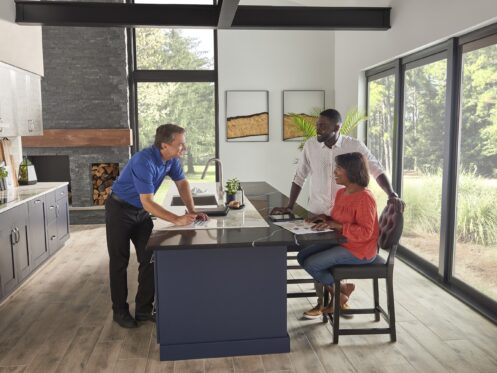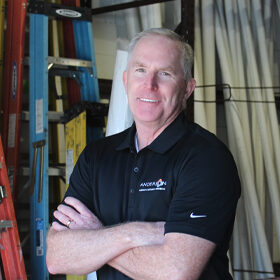Here in Mentor, OH, HVAC use makes up a large majority of an average home’s energy costs. Anything you can do to improve your HVAC efficiency is worth considering. The trouble is, not every homeowner knows about the available HVAC efficiency upgrade options. To remedy that, here’s a guide to all the ways you can boost your home’s heating and cooling efficiency.
Smart Thermostats
If your home has a mechanical or basic programmable thermostat, you may not be utilizing HVAC efficiency fully. To remedy this problem, it’s wise to consider upgrading to a smart thermostat. Smart thermostats have numerous advanced features that can trim your heating and cooling costs.
According to the Department of Energy, a basic ENERGY STAR-certified smart thermostat saves users approximately 8% on heating and cooling. According to leading smart thermostat manufacturer Nest, its smart thermostats save owners 12% and 15% on heating and cooling, respectively. Ecobee, another major smart thermostat maker, says its thermostats save customers up to 26% on heating and cooling.
It’s also worth pointing out that smart thermostats connect to the internet to enable remote management from anywhere. This can help you save money by letting you change settings whenever needed. For example, if you’re traveling and decide to extend your trip, you can instruct your HVAC to stay in vacation mode for longer.
If you forgot to make a manual change before leaving for work, make an adjustment when you arrive at the office. Smart thermostats can also provide preventative maintenance and malfunction alerts that can help you get ahead of efficiency-sapping malfunctions.
HVAC Ductwork Sealing
If your home relies on ducted central HVAC, you may be losing efficiency here. That’s because estimates indicate that ducted HVACs experience ductwork losses of up to 30% in average homes. That’s a big chunk of your heating and cooling costs being wasted. To reduce that waste, you can have your ductwork inspected and resealed every few years.
In accessible locations, the process can include retaping ductwork joints or replacing damaged sections. However, since most of the average home’s ductwork runs through finished walls, a sealant application may become necessary.
Aeroseal is a non-toxic, water-based sealant that gets blown into your home’s ductwork. As it travels, it sticks to the edges of gaps in your ductwork and builds upon itself. Eventually, the buildup seals those gaps and sets into a flexible, caulk-like substance. According to its manufacturer, Aeroseal alone can reduce ductwork leakage by 90% or more.
HVAC Zoning System Installation
One of the most significant drawbacks of a typical ducted HVAC is that it only offers single zone heating and cooling. That means it attempts to balance airflow in such a way that every space stays as close to your set temperature as possible. Unfortunately, interruptions in airflow and dynamic heating and cooling loads often result in hot and cold spots in your home. To correct those problems, you may turn up your HVAC to compensate, wasting money in the process. The good news is that there’s an HVAC efficiency upgrade to correct that.
Installing an HVAC zoning system in your home splits it up into multiple individual heating and cooling zones. The process involves adding motorized ductwork dampers in strategic spots and installing an additional thermostat in each zone. Then, the zones only receive heating or cooling when necessary. Not only will this improve your comfort, but it will reduce your HVAC usage in most cases. You will have the ability to reduce HVAC demand in spaces you’re not using. HVAC zoning systems also maximize the benefits of certain high-efficiency HVAC systems.
High-Efficiency HVAC System Options
For maximally efficient heating and cooling, your most effective option is to upgrade your HVAC equipment. Depending on your existing HVAC solution, your energy savings may be massive. The following are some of your best upgrade opportunities.
Two-Stage and Variable-Speed HVAC Systems
One of the things that leads to a typical HVAC system wasting energy is its inability to modulate its output. That’s because the average HVAC system includes single-stage operation. That means its compressor, heating elements, and fans have only one setting—full power. Unfortunately, your HVAC system uses the most energy when it first turns on, especially in cooling mode. Since single-stage HVACs cycle on and off frequently, they waste significant energy that way.
A heating or cooling installation that gets you upgraded a two-stage or variable-speed system can reduce that waste. These systems can operate at reduced speeds when you only need minimal heating or cooling. This results in longer and less wasteful cycle times. They also maximize the benefits of the zoning systems.
Air-Source Heat Pumps
If your home now has a traditional ducted AC and furnace combination, you may want to consider upgrading to a heat pump. Air-source heat pumps offer high-efficiency all-electric heating and cooling. In cooling mode, many rank among the most efficient ACs on the market. In heating mode, they are impressive. Heat pumps don’t consume electricity to generate heat. Instead, they extract existing heat energy from the outdoor air. A heat pump can reach 400% efficiency in mild weather, and high-end heat pumps outperform the average furnace even in sub-zero temperatures.
Ductless Mini-Split HVAC
If you live in an older home, your options for high-efficiency heating and cooling were once limited. Today, that’s no longer the case. Modern ductless mini-split heat pumps offer a flexible, high-efficiency heating and cooling solution.
A mini-split combines a single outdoor unit with a number of indoor, wall-mounted air handlers, offering an ideal HVAC solution. There can’t be any ductwork losses because they don’t use any. Also, you don’t have to heat or cool any part of your home when nobody’s occupying it. You’re not closing off any sections of ductwork like a traditional ducted HVAC system, meaning you don’t have to worry about airflow issues.
Geothermal HVAC
If money’s no object and your property has space, there’s one more hyper-efficient HVAC upgrade to consider. This is a geothermal HVAC system. This option combines a heat pump and a buried ground loop to provide year-round comfort to your home. This is the only HVAC system that beats an air-source heat pump in terms of raw efficiency. They do so by exploiting the stable temperatures found just a few feet below ground. No matter the time of year, below-ground temperatures tend to hover at around 54 degrees Fahrenheit.
That makes it a perfect place to expel heat from your home in the summer efficiently. And it’s an even better place to collect heat energy to warm your home in the winter. As a result, geothermal HVAC can save you up to 50% on your cooling costs and 70% on your heating costs.
Your Local Efficient HVAC Upgrade Experts
If you’re looking for cost-effective HVAC efficiency upgrades in Mentor, Anderson Heating, Cooling, Plumbing & Electric is the place to turn. We sell and install the latest efficient heating and cooling solutions from the industry-leading Carrier brand. We offer a No-Lemon Guarantee and an Installation Workmanship Guarantee for the ultimate in peace of mind. We’re also HomeAdvisor screened and approved, so you know you can trust us to deliver exceptional service.
If you’re interested in HVAC efficiency upgrades in Mentor, call Anderson Heating, Cooling, Plumbing & Electric today!


